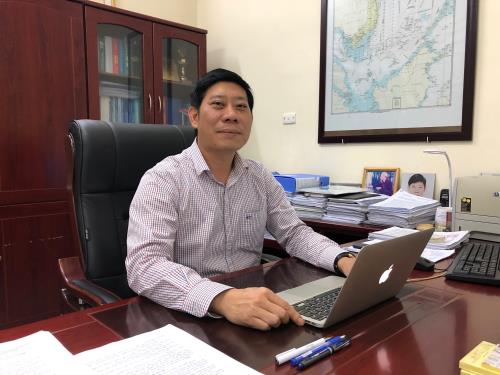 Economy
Economy


|
| Nguyễn Quang Hùng, Deputy Director of the Directorate of Fisheries |
Việt Nam has implemented many solutions according to the European Commission (EC)’s nine recommendations to remove the yellow card warning on the country’s fishing industry. In November, the EC will come to Việt Nam for the second time to check and re-evaluate the implementation of these recommendations.
Nguyễn Quang Hùng, deputy director of the Directorate of Fisheries under the Ministry of Agriculture and Rural Development, speaks to the Vietnam News Agency about this issue.
What has Việt Nam achieved recently to meet the EC’s requirements?
Việt Nam has implemented groups of solutions according to the EC’s nine recommendations in abolishing the yellow card warning the EC imposed on Vietnamese seafood for failing to make progress in fighting illegal, unreported and unregulated (IUU) fishing.
Việt Nam has set up a National Steering Committee on Illegal, Unreported and Unregulated (IUU) Fishing Prevention and Control to facilitate direction on this issue from central to local levels.
In addition, 28 coastal provinces and cities have also set up offices of inspection and control at fishing ports and implemented circulars and decrees under the Fisheries Law 2017, especially solutions against illegal exploitation.
Thereby, control of fishing vessel operations and seafood output at ports is implemented well to serve traceability and collection of fishing records.
After the first meeting of the National Steering Committee on IUU Fishing Prevention and Control, Deputy Prime Minister Trịnh Đình Dũng assigned the Ministry of Defence to coordinate with relevant offices to prevent illegal fishing from Vietnamese vessels.
To solve this problem, the National Steering Committee will work with the Ministry of Defence to develop a comprehensive solution to stop illegal fishing by local vessels.
With the drastic participation of the Ministry of Defence and localities, illegal fishing will be solved.
Meanwhile, the Ministry of Agriculture and Rural Development as well as the Directorate of Fisheries have also intensified meetings with the EC to provide information about Việt Nam's efforts in solving this problem.
Việt Nam has basically implemented EC recommendations on issues relating to the legal framework. For the group of recommendations relating to law enforcement at sea, the Fisheries Law is an important legal basis for further implementation.
For the recommendations on international cooperation, Việt Nam has strengthened ties with other countries in the region and established an international illegal fishing prevention hotline. The international cooperation is bringing about noticeable efficiency in preventing illegal fishing activities.
Another point that Việt Nam has performed very well is the fishery exploitation management towards sustainable development. Specifically, the granting of fishing quotas in coastal, inshore and offshore areas for local vessels as the EC's requirement is one of the measures on developing sustainable exploitation.
In the future, localities will continue to complete the installation of GPS for fishing vessels because this is also an important issue in the management of fishing vessels and minimising illegal fishing. It is also possible to control the position and support for fishing vessels in distress.
What have localities done to solve the yellow card?
According to the Directorate of Fisheries, 28 coastal provinces and cities have been very active in solving the yellow card, from issuing directions of the Prime Minister and guidance of the Ministry of Agriculture and Rural Development to guiding fishermen to partake in sustainable exploitation without illegal fishing.
However, the biggest difficulties currently are human resources in the fishing field and infrastructure in many localities that have not met the requirements.
Other countries have dealt with those issues, including the establishment of a national centre on supervision of fishing vessels or increasing human resource for localities. For example, Thailand has established 31 fishing vessel control stations in its waters.
In Việt Nam, each fishery sub-department has only 3-5 staff members that must perform many different roles. Therefore, when assigning them to join the Fishing Vessel Control Office, they do not have time to do other work. Meanwhile, the number of fishing vessels is very high and the staff members must be on duty 24 hours a day at fishing ports. This is the biggest difficulty in coastal localities.
Regarding this issue, the Ministry of Agriculture and Rural Development has recommended localities prioritise investment in fishing port infrastructure, meeting EC requirements.
What should Việt Nam do to remove the yellow card for the seafood exploitation next years?
In the future, the Government needs to re-plan the fishing exploitation industry and the fishing port system as well as increase investment in infrastructure according to the EC requirements and the sustainable development strategy of fishing exploitation.
At present, the awareness of fishermen is the most important issue, including how they comply with provisions against illegal fishing. Now, the State office lacks human resources to control fishing activities while there are a large number of fishing vessels with about one million fishermen operating at sea.
Therefore, localities need to strengthen measures to raise fishermen's awareness of sustainable exploitation. This is the most important solution. Fishermen must understand that the State has many guidelines and policies to maintain sustainability in fishing exploitation and ensure livelihoods for fishermen. When removing the yellow card, fishermen are the beneficiaries. — VNS




